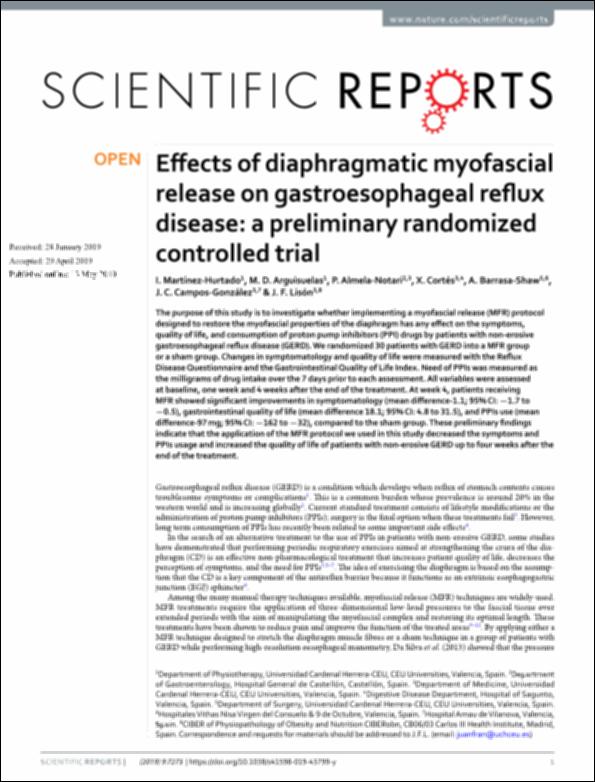Please use this identifier to cite or link to this item:
http://hdl.handle.net/10637/10900Effects of diaphragmatic myofascial release on gastroesophageal reflux disease : a preliminary randomized controlled trial.
| Title: | Effects of diaphragmatic myofascial release on gastroesophageal reflux disease : a preliminary randomized controlled trial. |
| Authors : | Martínez Hurtado, Isabel Arguisuelas Martínez, María Dolores Almela Notari, Pedro Cortés Rizo, Xavier Barrasa Shaw, Antonio Rafael Campos González, Juan Carlos Lisón Párraga, Juan Francisco |
| Keywords: | Digestive organs - Diseases - Treatment.; Gastroesophageal reflux disease - Treatment.; Stomach - Diseases - Treatment.; Enfermedad por reflujo gastroesofágico - Tratamiento.; Estómago - Enfermedades - Tratamiento.; Aparato digestivo - Enfermedades - Tratamiento. |
| Publisher: | Springer Nature. |
| Citation: | Martínez-Hurtado, I., Arguisuelas, MD., Almela-Notari, P., Cortés, X., Barrasa-Shaw, A., Campos-González, JC. et al. (2019). Effects of diaphragmatic myofascial release on gastroesophageal reflux disease : a preliminary randomized controlled trial. Scientific Reports, vol. 9, art. 7273 (13 may.). DOI: https://doi.org/10.1038/s41598-019-43799-y |
| Abstract: | The purpose of this study is to investigate whether implementing a myofascial release (MFR) protocol designed to restore the myofascial properties of the diaphragm has any efect on the symptoms, quality of life, and consumption of proton pump inhibitors (PPI) drugs by patients with non-erosive gastroesophageal refux disease (GERD). We randomized 30 patients with GERD into a MFR group or a sham group. Changes in symptomatology and quality of life were measured with the Refux Disease Questionnaire and the Gastrointestinal Quality of Life Index. Need of PPIs was measured as the milligrams of drug intake over the 7 days prior to each assessment. All variables were assessed at baseline, one week and 4 weeks after the end of the treatment. At week 4, patients receiving MFR showed signifcant improvements in symptomatology (mean diference-1.1; 95% CI: −1.7 to −0.5), gastrointestinal quality of life (mean diference 18.1; 95% CI: 4.8 to 31.5), and PPIs use (mean diference-97mg; 95% CI: −162 to −32), compared to the sham group. These preliminary fndings indicate that the application of the MFR protocol we used in this study decreased the symptoms and PPIs usage and increased the quality of life of patients with non-erosive GERD up to four weeks after the end of the treatment. |
| Description: | Este es el artículo que se ha publicado de forma definitiva en: https://www.nature.com/articles/s41598-019-43799-y En este artículo también participa J.F. Lisón . |
| URI: | http://hdl.handle.net/10637/10900 |
| Rights : | http://creativecommons.org/licenses/by/4.0/deed.es |
| Issue Date: | 13-May-2019 |
| Center : | Universidad Cardenal Herrera-CEU |
| Appears in Collections: | Dpto. Enfermería y Fisioterapia |
Items in DSpace are protected by copyright, with all rights reserved, unless otherwise indicated.


